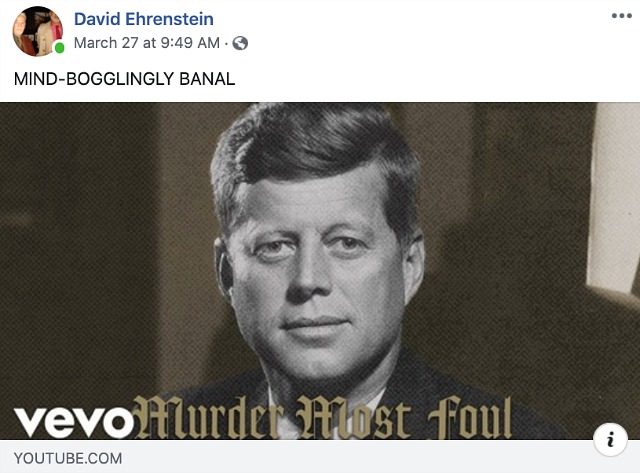A day or two ago David Ehrenstein complained that Bob Dylan‘s “Murder Most Foul”, a 17-minute long meditation about the brutal murder of the nation’s 35th president, was “mind-bogglingly banal.”
Not Dylan’s vocal performance or the musicianship, I presume he meant, but the lyrics. Lines and passages that are flush with familiar cliches and rueful reflections, well-baked recollections, ’60s pop-culture references, etc.
Ehrenstein is missing the forest for the trees. The lyrics aren’t as important, I feel, as the tired and resigned way in which Dylan half-sings and half-mutters them, and more particularly why he’s released the song now.
I don’t know when “Murder Most Foul” was written and recorded but deep down I don’t think it’s about JFK’s last day on the planet as much as Dylan’s contemplation of his own mortality, and how he’s evolved into a wizened old coot who regards the gift of life with absolute reverence (age does that to you).
Simplistic as it sounds, he’s basically horrified by the idea of conspirators abruptly destroying everything that JFK had been and could be. Horror magnified in his mind. Along with the sadness. Dylan’s sense of his own mortality is undercurrent #1.
In late ’63 or early ’64 Dylan, then 22, said something about partly understanding where Lee Harvey Oswald was coming from, not to the point of agreeing with what he’d done but in terms of sensing his underlying despair. Dylan reportedly walked that statement back fairly quickly, but it was exactly the sort of thing that a brilliant iconoclast in his early 20s might’ve passed along.
Now Dylan is 78, and he sees things differently. The point of the song (one of them anyway) is that JFK’s murder, like that of Tom Dooley or Fred Hampton or Martin Luther King or any illustrious victim of a ruthless political agenda, was at root an act of terrible cruelty, and Dylan is simply saying that this particular act of malice has burned deep, and that 56 years later the after-shocks still register from to time, and that he can feel them more today than he did in the fall of ’63. Or something like that.
Above and beyond the lyrics, the song is basically a meditation about the horror of suddenly becoming lifeless tissue, at any age.

Remember that scene in Unforgiven in which Clint Eastwood‘s William Munny character is talking to that young trigger-happy doofus with the blonde hair? The kid guesses that a guy they’ve recently killed “had it comin'”, and Munny says “we’ve all got it coming’, kid.”
When he wrote “Murder Most Foul” Dylan was in a William Munny kind of place.
